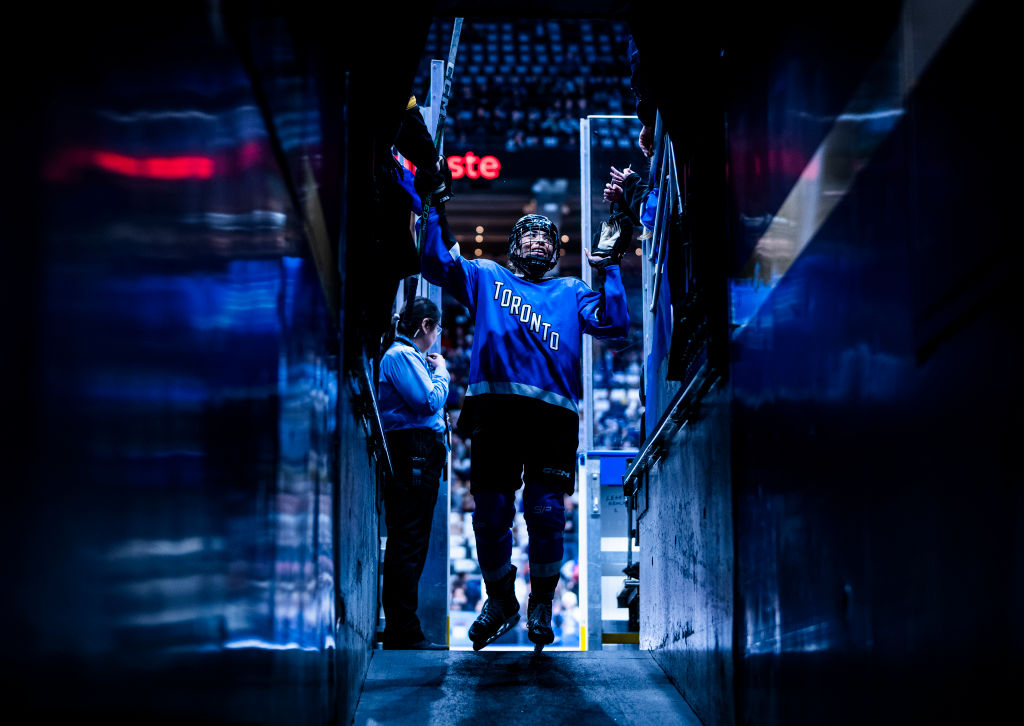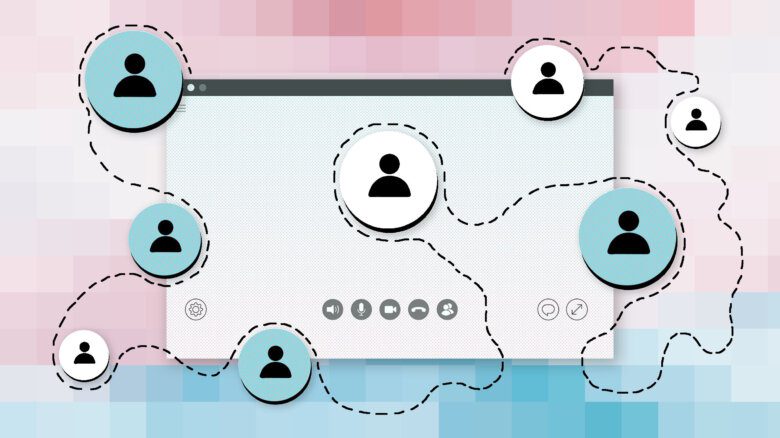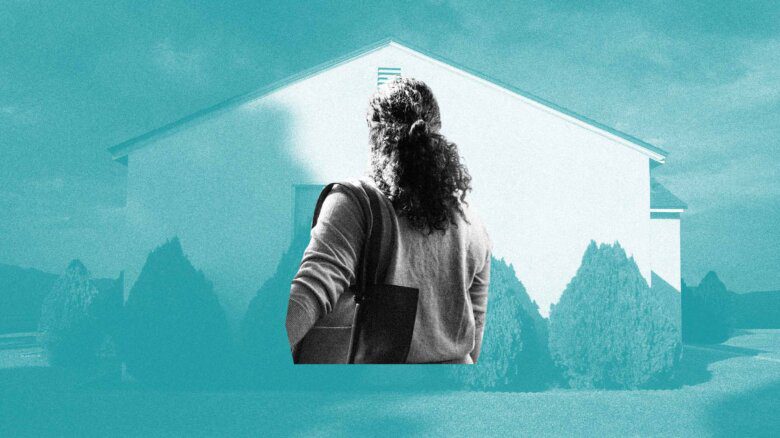Montrealer Amy Fishman wasn’t sure what to expect when she walked into Champs Sports Bar with a friend to watch her local women’s hockey team play Minnesota last month. By the time the final buzzer rang, she and the strangers at the bar were knocking back celebratory shots of Fireball and trading knick-knacks they’d bet the score on.
“I’m pretty shy, I don’t really like putting myself out there a lot, but it gave a platform for us to talk to each other and allowed for everybody to connect, which is a really nice thing,” the 33-year-old says. “It didn’t feel awkward, it didn’t feel scary.”
As someone without a sports background, Fishman wasn’t sure if she’d fit in with the crowd at the unofficially lesbian bar in Montreal, where people have been gathering regularly to watch the first season of Professional Women’s Hockey League (PWHL) games. But, she says, the space and people made her feel welcome, with the game serving as an icebreaker between her and other queer people at the bar.
“I just felt that there was a sense of camaraderie and community here that was so cool to experience,” she says. “I really had a lot of fun getting into the game, and cheering and having a good time with everybody, and I wouldn’t have ever thought I’d get into it like that.”
The idea of bars regularly drawing in masses to watch professional women’s hockey might’ve seemed like a far-off fantasy even just a few years ago. But since the PWHL’s first puck drop in January, dozens of queer bars across North America have committed to showing the games.
It’s become a way for people to come together and share their love of hockey, but also a way for intergenerational queer communities to be built, says Jillian Hiscock, owner of A Bar of Their Own, Minneapolis’ first sports bar dedicated exclusively to women’s sports. The bar, which opened at the beginning of March, takes its inspiration from The Sports Bra in Portland, which opened in 2022, showing all women’s sports with the sound on.
“It was women’s college basketball, the Final Four was here, I’m surrounded by all these women’s sports fans planning this huge women’s sports event and this bar opens up over in Portland,” Hiscock said. “We were just like, ‘Oh my gosh, who’s going to do it here? We need this in Minneapolis.’ I kept waiting for somebody to do it, but nobody was doing it. I never thought it would be me.”
Hiscock said that the Women’s National Basketball Association (WNBA) has been an entry point for many queer fans, and brought in masses to the bar in its first month of service, which coincided with March Madness. Along with the PWHL—A Bar of Their Own is the official Minnesota watch party location—Hiscock hopes that the space can continue to grow into a community hub for fans young and old to cheer on their teams.

She’s willing to go above and beyond to make that dream a reality—recently she kept the bar open late when a customer in her 90s showed up after last call.
“Of course I’m staying open. She’s chosen to come here, and I want somebody like her to be able to see this space. I’m a huge believer in the fact that we’ve gotten to where we are today because of all the people who did this work—almost always thanklessly—before us,” Hiscock says. “We wouldn’t be creating this historic place, this historic setting, without the people who got Title IX passed, without the people who were the first woman on a men’s team, without all of these things happening.”
Miriam Isra makes a special effort to cheer for her home team, PWHL Toronto, at Peaches Sports Bar, despite the 54-kilometre round trip commute from neighbouring Mississauga. The people she’s met at the bar have been more than worth the train ride.
“There’s a lot of diversity in age. I remember my first evening in Peaches, looking around, and I saw elderly queer people around me just wearing jerseys and existing with their older queer friends,” the 25-year-old says. “It’s wonderful because I don’t get to see young queer people and older queer people coexist in our spaces often. So it’s nice to see that everybody feels welcomed and included.”
At the same time, she’s been picking up a new love for hockey.
“The NHL and the hockey scene has always been historically unwelcoming toward marginalized communities. So it’s wonderful to be able to exist in this space, and not have to worry about being open and lesbian,” she says. “The atmosphere is much more enjoyable than the typical dude-bro sports bar. And nobody’s going to ridicule you if you’re new to hockey and aren’t totally aware of the rules.
“Elbow to elbow”
PWHL games are often the busiest nights of the week at many queer-friendly bars that screen the games.
“Everyone’s packed in elbow to elbow, to the point where I have to convince my friends to go to the bar an hour before the game starts, just so we can grab a seat,” Isra says. “I’m so glad that I even have to worry about the possibility of not being able to find a table because it really goes to show the excitement and demand for women’s sports.”
Players and executives in the PWHL want to see the league continue to propel the demand for women’s hockey. Announced in August 2023 with six founding teams (Montreal, Toronto, New York, Boston, Ottawa and Minnesota), the league came together quickly, with the first game taking place on New Year’s Day, only six months later. It replaces past women’s hockey leagues to form one unified league that is “truly professional”—and that actually pays its players.
It was an instant success, with the first game drawing in nearly three million viewers, and tickets selling out throughout the season, sometimes in under 20 minutes. Last Saturday’s sold-out game at Montreal’s Bell Centre broke records, with over 21,000 fans bagging tickets, and more and more people have been tuning in to watch teams compete for playoff spots and, ultimately, the Walter Cup.
Though some doubted the league would be a success, Peaches co-owner Ronnie Saye says the PWHL is exactly what queer sports fans have been waiting for. The success of her bar’s viewing parties, she says, are a testament to the queer communities that can form around women’s sports when they’re given the chance to flourish.
“I think that there has been a longing for this kind of thing for quite some time. I mean, it’s brought tears to my eyes on a number of occasions,” she says. “All we’ve done is given this community a place to go. It already existed. It’s a welcoming community, so it’s experiencing a lot of growth and people are becoming interested in it, but they were already there.”
Peaches shows a variety of women’s sports, with crowds for the PWHL and recent March Madness tournaments filling the bar to the brim. The PWHL has been especially well attended, with the league’s Toronto team even gifting bar staff a suite at one of the games in recognition of their support throughout the season.
“It’s packed. And we’ll have lineups down the street, which is so cool. Our capacity is pretty high, so it’s a great sports bar environment, and the atmosphere is electric. People are cheering, shouting, screaming, high-fiving, hugging,” says Saye, who added that the bar isn’t exclusively for queer clientele.
“The ethos behind it was always to be all-inclusive, but to have a focus on folks who feel othered in sports bar spaces so that they’re able to feel comfortable, have their pronouns respected and have a great experience while watching any kind of sport that we’re playing.”
Making space
Like Peaches, Montreal’s Champs wasn’t initially intended to be a queer space.
The bar, which has existed in Montreal for about 30 years, reopened two and a half years ago under new ownership after a years-long hiatus. Since then, it’s become one of the only establishments in Montreal catering to lesbians, hosting hordes of them, in fact, for events like its weekly Dyke Night and women’s sports games.
“Initially, we didn’t set out to make it a gay bar, but we did want it to be open to everyone in a way that most sports bars aren’t,” says Rob Jennings, Champs’ general manager. “It’s become sort of a lesbian hot spot in Montreal, but it’s something that’s happened organically, and not something that we planned.”
Champs has committed to being a gathering spot for every single Montreal PWHL game, even opening the bar early for daytime matches, something that bartender and Dyke Night co-founder Saz Zenetzis says is special, since most other sports bars aren’t playing PWHL games at all.
“I think it’s important because there needs to be some stability. I think coming from a community that historically doesn’t have that stability, whether it be in your family or whatever, having somewhere that queer people can come and just hang out is important,” they say.

The bar is often packed with fans, though other times—typically daytime home games, when locals nab tickets to see games in person—there will be a smaller, more casual crowd.
“Sometimes I have the most fun when there aren’t necessarily a lot of people at the bar. I get the chance to get to know everybody and the patrons get the chance to talk to each other, which is awesome,” Zenetzis says. “I just think having a regular occurring event is really, really important.”
Hiscock shares that sentiment and wants A Bar of Their Own to foster bonds between Minnesotans.
“I really wanted families to come, I really wanted young kids to see women’s sports on television,” Hiscock says. “I love being in a space where two moms have their little six-year-old girl who’s watching hockey sitting next to a woman who couldn’t play hockey because Title IX hadn’t passed yet when she was in middle school.”
“Safe Place”
In contrast with the NHL, where celebrating Pride has faced backlash from players, the PWHL has Pride Night games throughout the season that have been met with open arms.
Queer PWHL Toronto goaltender Carly Jackson says it’s only natural that queer communities have been flourishing with the league.
“I think women’s hockey has always been, in general, a place of positivity for the queer community. There are so many queer people in sport, whether people want to admit it or not,” they say. “Now that our sport is getting the platform it deserves, it’s really just shining even brighter than before. There’s a lot of queer support, but nobody who’s in it is surprised that this is what women’s hockey is like when you give it the support it deserves.”
Jackson says that establishments putting in the effort to foster queer communities around women’s sports are integral to the ongoing success of the PWHL.
“To go to a place where you feel celebrated just for being who you are—that’s the coolest thing ever,” they say.
Jackson’s teammate, defender Allie Munroe, says queer fans are at the centre of women’s hockey. As an openly gay player, she says she’s motivated knowing that the wider queer community is behind her.
“We know about Peaches in Toronto, and we saw everyone having so much fun at the watch party. All the players were pretty excited about that—it’s just cool to see different communities and people coming out and watching our games, and that’s what we want,” she says.
She’s delighted to know that people are making connections over the PWHL.
“I love that we can be a starting point for new friendships and new relationships. To have people come together, it’s a really special thing, and as players we make sure we don’t take that for granted,” she says. “We want to make everyone proud, and knowing we have that strong following from the queer community is very, very special. I think that’s more important than whatever we do on the ice.”
Air time
Although the PWHL is making waves in women’s sport viewership, there are still barriers to overcome. A 2021 study from Samford University found that because networks don’t put women’s sport on radio and TV, it’s extremely hard to livestream games, with nearly one-third of fans saying that they haven’t watched women’s sports in the last year for that reason.
“Women’s sports can be logistically difficult to broadcast,” says Jennings, who often has a hard time finding high-quality reliable streams for sports that Champs’ clientele request. “Thankfully, the PWHL has been really good about broadcasting rights, they decided to put all of their games for free on YouTube, so we’re able to put on at least three screens relatively easily for most games.”
As the popularity of women’s sports continues to grow, fans are hoping that more spaces will spring up that offer queer fans safe and exciting spaces to watch the games and build community.
“I think this is a really exciting time for women’s sports and the PWHL in particular, and I’m hoping that we can continue to build even more inclusive and safe spaces for queer people to be able to exist and watch the games,” says Isra. “I can’t even begin to imagine the impact that the PWHL has already had on the future of women’s hockey. We can cultivate these spaces where people can feel like themselves, and feel like they can meet other people and make lifelong memories as well.”
The PWHL playoffs start May 8. The full schedule and standings can be found on the league’s website.


 Why you can trust Xtra
Why you can trust Xtra


